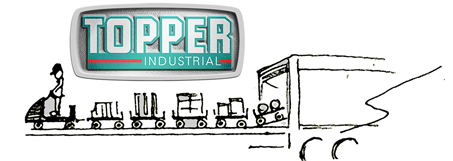Industrial carts are the backbone of the Fork Truck Free (FTF) environment and Industry 4.0. This paradigm shift in intralogistics, automation, integrating, managing, and optimizing the logistical flow of material goods with the flow of information within the walls of a fulfillment center, distribution center (DC), or warehouse represent the tremendous opportunity for businesses to tap potentials. Improving efficiency, transparency, and productivity in the supply chain is possible by intelligently networking elements in the logistics system, logging massive amounts of data, learning from conditional results, and adapting system behaviors.
Both manufacturing firms and intralogistics operations use supply chains to attain leading technological positions in an increasingly competitive marketplace. The evolution of Industry 4.0 in conjunction with FTF efforts generate the optimization of the systems and operations within the physical infrastructure of existing and new supply chain nodes.
Direct delivery of products to consumers necessitates fast order fulfillment and fork trucks slow down the process. The time to pick, pack, and ship will be in minutes in an FTF string of carts, rather than hours, generating greater levels of efficiency in the fulfillment process. Filling direct-to-consumer orders requires handling individual items rather than cases or pallets. Handling individual items continue to be very labor intensive and complex, meaning companies will need to find new ways to improve efficiencies in the e-commerce.
By 2025, the intralogistics industry must be capable of supporting a highly diverse set of order and distribution channels in keeping with mass customized products and delivery methods. Customers expect deliveries of customized product anywhere at any time, placing fierce demands on DCs for faster throughput. Industry 4.0 data driven approach when combined with FTF will play an integral role.
Workforce scarcity further accelerates the trend driving the transition to Intralogistics 4.0 and FTF. According to the U.S. Census Bureau, 60 million “Baby Boomers” will exit the workforce by 2025, while only 40 million new workers will enter the job market. The cost of finding, training, and retaining increasingly scarce labor is about to reach a tipping point. With labor being a substantial portion of operating budgets, escalating labor costs have a significant impact on margins. Skill gaps in the workforce include problem-solving abilities, situational response expertise, abstract reasoning, and even basic work ethics. And there is no indication these trends will be reversed.
Topper Industrial will be at ProMat in Chicago Booth #S4812 from April 8 – 11, 2019. Register to attend HERE.
About Topper Industrial
For more than twenty years, Topper Industrial, (www.topperindustrial.com) has been a leading manufacturer of material handling carts and equipment solutions. Topper Industrial designs and builds industrial delivery carts, cart lifts, lifts & tilts, material handling racks, steel containers, casters, tube & joint and industrial cart parts & components. Topper Industrial specializes in services to Manufacturing, Fulfillment, Warehousing and the Distribution Sectors. Topper Industrial’s services include, but are not limited to: Design & customization, manufacturing & production, site analysis & planning and implementation justification. Topper’s material handling solutions make delivering material line side more effective through more efficient practices.
Topper Industrial is a proud member of MHI. Follow on Twitter @TopperInd or on LinkedIn.

